The King of Stracciatella
Can y'all believe I got the lead singer of Petty Walker to join me today????
This post is too long to appear in full in your inbox. I don’t know where it will cut off in the email version, but it will be available online. See you there!!!
Growing up, my siblings and I had this toy that was just two shiny grey oblong magnets that would always find their way back together. Granted, that was only if you held the correct parts of the magnet together. If you pointed, let’s say, the positive end of one magnet at the positive end of the other, the magnets would repel one another often in a funny, almost dance-like way.
For my entire life, my brother and I have been the same end of two magnets—united by blood and more similarities than I used to care to admit, but comedically repulsive to one another. Then, for a few years, the joke stopped being funny to the point where some people reading this may be surprised that Calvin and I are even talking today. But everything really is copy in the end so we’ve turned what was once a massive point of contention into an earnest conversation.
This week, I’m joined by Calvin Sharp to talk about his experience working in the service industry, what it’s like to pursue a less traditional career path, the two main approaches to young adulthood, and how we can better understand and support one another.
Hello I am Calvin Sharp and I am Emily’s brother.
You Are the Sandwich King, Young and Sweet, Only 24
One of the weirder experiences I’ve had on social media was seeing my brother in a stranger’s TikTok on my For You Page.
In fairness, it wasn’t Calvin per se that the creator was posting about so much as the sandwich shop he currently runs but even that’s still a little odd to wrap my head around—people are entrusting my brother? After they’ve met him?
Entrusting him to kick things off today, I asked:
Emily: Can you walk me through your career history? How did you end up at All' Antico Vinaio?
Calvin: Besides an early high school summer stint as a parking attendant, my illustrious working career has always been in the service industry. I was a pretty bad barista for a while when I was 17. I graduated from busboy to food runner to all-around utility boy over the course of a few years at a popular upscale-ish Mexican restaurant.
I worked for three days at a winery in New Jersey. I helped run a deli/Italian restaurant for around two years, where I did everything from washing dishes to running catering events worth thousands of dollars. While I was there, I swore I would never work in a restaurant again, or at least never trim a leg of prosciutto again, or at least never get yelled at by an idiotic patron again, or at least never have to clean a bathroom covered in piss again, or at least never have to make a sandwich again.
Then, about two years ago now, I needed a job to move to New York, so I went back on all the promises I made to myself and got a job at an Italian sandwich shop. Unbeknownst to me, the shop, All’ Antico Vinaio, is one of the most famous sandwich restaurants in Italy, and I happened to get in just as they were opening up in America.
I worked my way up to managing one of the locations, and I’m going to be in charge of another one when it opens next month.
Emily: What did you most want to be growing up?
Calvin: When I grew up I wanted to be a rock star and a pizza chef. I thought the two coolest things you could do were playing guitar on a stage and tossing pizza dough up in the air. My band has about 30 monthly listeners on Spotify and sandwiches are almost pizza, so I guess I’m doing pretty well.

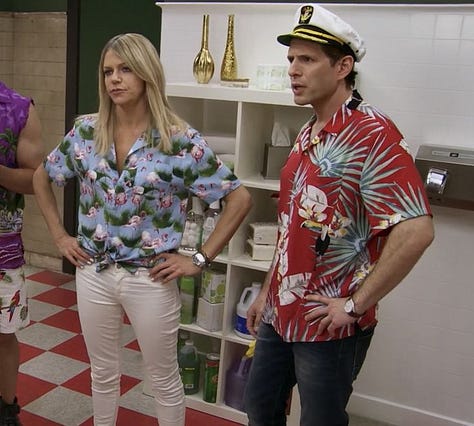
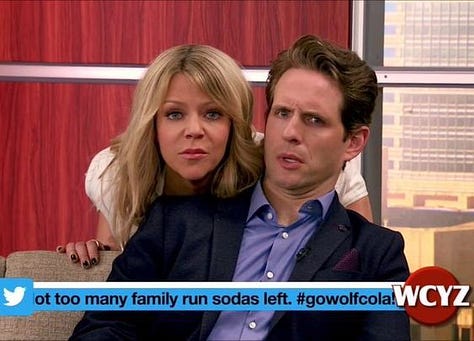
Emily: What drew you to the food service industry, as well as to your current role?
Calvin: Our dear father is the thing that “drew” me into the restaurant business, though I’m not sure he expected or intended this to be the outcome. As you know, he had a lot of formative experiences working in restaurants and insisted I find a job at a place that would impart the same kind of lessons on my mushy 17-year-old brain.
A little over a year ago, I once again attempted to leave the industry for some reason. I got a job doing some low-level email bullshit at some bullshit financial company my friend worked at. I lasted two days in the office before I went remote. I lasted three months remotely before I went back to working in a restaurant.
I remember looking around the office during those two days and thinking pretty much only two different things all day: Where the fuck am I? and I don’t want to talk to any of these people. The remote stuff just left me less satisfied, less invigorated, and, probably most importantly, much more broke than I had been when I was making sandwiches.
I have a distinct memory of my birthday that year, about a month into my laptop job, when my girlfriend took me out to dinner at a beautiful French restaurant in the West Village. This place, Boucherie, had a separate open kitchen for the station where they cooked all the steaks. Our table was pretty much directly above the station, and I spent much of the dinner mesmerized watching the cooks.
The quickness at which they moved and performed, while at the same time seeing the way they were joking around with each other in the middle of a weekend dinner rush, made me miss my old job. It was like watching my own memories of all the times I’d spent simultaneously working my ass off and completely fucking around in kitchens played back in front of me. There was nothing about my situation at the time that felt like it could provide that same kind of living to my life.
About a month after that, my girlfriend started picking up some shifts at the All’ Antico location that had opened up just as I had left the company. Having probably had enough of my months-long bemoaning and gloom, she pretty quickly convinced me that I belonged back at the shop, where I am still currently.
Emily: How did working in the service industry during the height of the pandemic shape certain worldviews? How do you feel about it all now?
Calvin: I do remember a lot of the stuff I saw or heard during the pandemic really pissed me off, mostly in regards to the way people talked about morality, or following rules.
At the time, it seemed to me the people who had the easiest situation to deal with the weirdness of the pandemic—and the ability to follow certain health protocols—were the ones that were most critical/militant of other people’s behavior the whole time. Like, the people who could afford to stay at home the whole time and have all of their meals delivered were the ones who were the most up in arms about somebody not wearing a mask on the subway or something.
I just didn’t think it was fair, that the people who had to go to work in person and come in contact with lots of different people and had no option not to, were not the ones that got to dictate the conversation about our changing societal processes. I am not as pissed off about it because I try to not get angry at other people for stuff like that anymore.
Emily: What do you like most and what do you like least about working in the food industry?
Calvin: What I like most about the service industry is the combination of craziness and community. I like running around for nine hours straight because I feel like I’ve done something each day. I like having to solve problems on the fly in high-stress environments. I like making connections with people coming in based on something I made for them. I love the camaraderie with your coworkers in a restaurant, like the way your crew—and only your crew—can understand the intricate frustrations and complaints that come up throughout the day.
I love the wacky people you end up being around, and how many conversations about aliens and pyramids and Madonna and the country of Jamaica that I’ve had. I love the relief you feel when you and a coworker have a couple of Modelos in the walk-in after you guys got your asses kicked all day. I like making fun of people in Spanish. I love the physical and mechanical mastery of having a knife in your hand. I like being able to actually fall asleep at night because your brain is fried to the point of exhaustion after all the shit you had to keep track of all day. I like feeling useful and productive.
What I like least about the service industry is people with food allergies and how much my back hurts.
For the record, three out of the five members of our family can’t eat gluten so that last line feels a little pointed. Aside from that, though, Calvin’s responses highlight something really interesting and important: growing up, he was always a very creative kid who didn’t respond well to rules or rigid expectations. It makes sense then that his career path is one chock full of unique personalities, creativity in unexpected places, and situations that require him to think on his toes.
In fact, as a meaning type, Calvin might just be in one of the best industries for his approach to life.
You Come to Me…On the Day of My Quarterlife Crisis…
In her book Quarterlife1, psychotherapist Satya Doyle Byock discusses the traits, strengths, and weaknesses of the two approaches to life people tend to take in early adulthood: those who strive for security, success, and hitting milestones are aptly known as “stability types,” and those who chase their passions first and figure out the rest later are “meaning types.”
As Byock explained in a 2022 New York Times piece,
“Stability types” are seen by others as solid and stable. They prioritize a sense of security, succeed in their careers and may pursue building a family. “But there’s a sense of emptiness and a sense of faking it,” she said. “They think this couldn’t possibly be all that life is about.”
On the other end of the spectrum, there are “meaning types” who are typically artists; they have intense creative passions but have a hard time dealing with day-to-day tasks, Ms. Byock said. “These are folks for whom doing what society expects of you is so overwhelming and so discordant with their own sense of self that they seem to constantly be floundering,” she said. “They can’t quite figure it out.”
In case it wasn’t obvious, I (Type A eldest daughter with an anxiety disorder) am a stability type, and Calvin (middle child) is a meaning type. Throughout her book, Byock shows via case studies and personal experiences that neither approach is better or worse than the other despite preconceived notions, but learning which type you are and course-correcting some of your shortcomings can help prevent burnout and the potential for a midlife crisis later down the line.2
Inadvertently, Calvin and I have both been trying to take the healthiest approach to adulthood which, according to Byock, is a constant effort to find the middle ground between stability and meaning:
quarterlife is about becoming a whole person, Ms. Byock said, and both groups need to absorb each other’s characteristics to balance themselves out. Stability types need to think about how to give their lives a sense of passion and purpose. And meaning types need to find security, perhaps by starting with a consistent routine that can both anchor and unlock creativity (X).
This could just be my perception but it feels easier for a stability type like me to seek out meaning in our work as well as other areas of our lives than it does for a meaning type to try to find stability in a job or career where there might not immediately be any. But, since Calvin has done just that and I am still striving for the right balance myself, I wanted to ask:
Emily: What has it been like to start building a career that you can't typically prepare for before starting?
Calvin: It is definitely something I think about, or at least find kind of funny, the way that I am sort of “building a career,” but in the dumbest, loosest way possible.
I remember my junior and senior years of college when everyone was working towards lofty internships that would set them on a direct path for a certain career, while I mostly sat around with one thumb in my nose and the other up my ass. But now, in a way, I realize I had been doing my own bastardized version of it.
Every place I worked in was a step towards where I am now, whether that’s learning how to talk to different kinds of people, learning how to keep track and manage stock/inventory, learning to be okay with working twelve hours on a beautiful Saturday in July, or some other tangible peg in the totem pole of maturity.
Every conversation I had with a customer or coworker shaped me and built my confidence in myself, something that has allowed me to take on more responsibility. By the time I got back to the shop last January, I intentionally took on every additional responsibility I could because I could now clearly see that I both wanted and was capable of having a career in this line of work.



I want to pause here and circle back to the line neither approach is better or worse than the other despite preconceived notions because, at various points in our lives, Calvin and I have judged each other’s approach based on preconceived notions: he was better than me because he refused to sell his soul to an office job for money like I had, and I was better than him because I thought having a stable job gave me some kind of moral superiority.
Working on this piece prompted me to reflect on another conversation I had here with a family member: last year’s economic digest with my dad. In particular, I keep returning to this one part of our conversation:
Emily: Why is it that there are, at the same time, these low unemployment numbers, mass layoff announcements, and an increasing difficulty of getting re-hired?
Bill: Would you consider those white-collar jobs or blue-collar jobs?
Emily: Mainly white-collar.
Bill: Do you know the percentage of white-collar jobs relative to blue-collar jobs in the economy? In the past 50 years, the number of white-collar jobs have exploded and now make up approximately 85% of total employment and blue-collar jobs make up about 15%. Obviously, there’s a lot more people working today than in the 1970s and 80s but the number of white-collar jobs have grown a lot faster than blue-collar jobs.
When people lose or leave a white-collar job, they are less likely to accept or even be offered a blue-collar job because of the lower pay and different skill sets, whereas a blue-collar worker is much more likely to accept another blue-collar job. Currently, since the pandemic-related shutdown, there’s a greater number of blue-collar jobs available than white-collar jobs available.
Emily: I think the reason my friends and I are almost hesitant to apply for blue-collar, service industry jobs is because we’re told you are not paid a living wage there.
Bill: Going down the socialist route again?
Emily: You look at the hourly wage for some of these positions and you do the math out and it isn’t in line with what you were making at a previous position of yours, like you had said.
Bill: And that’s to support the lifestyle you’ve become accustomed to?
Emily: To pay my rent. I’m looking at different jobs to pay my rent.
Bill: I hear you. I hear you. When I lived in New York City, I could not understand how somebody who did not earn a high income could live there. Yet, more than half the population does. I think it comes back to your circle, what you’re accustomed to, the standard of living that you want to attain. The majority of people get by on $12, $13, $14 dollars an hour. You would if you had to, but right now you’re not at that point so you’re not forced to do that.
If you were, yes, you could get by on that. That could be a suitable living wage for you. In general, people don’t understand that they all have these expectations, and if they can’t achieve them, then it’s not fair. Reset your expectations.
While I stand by everything I said in that piece, candidly, I was embarrassed by how I sounded and how my dad kind of read me for filth.3 I hadn’t realized until then that perhaps I was holding on to preconceived notions myself and felt very exposed having realized that in real time while editing.
This brought me back to yet another conversation we had here last May4: as Ellie Haney and I discussed her mental health journey and why it took so long for her to share what she was going through with the people around her, I reckoned a bit with how the environment we grew up in often made everything into a competition. If people Calvin, Ellie, and I grew up with were able to make mental health into a pissing match, can you imagine what it was like to talk about college and careers? (A lot of you can because you also lived through it—in that case, our support group meets at 6 pm on Mondays.)
After going to a college that by and large had this same kind of environment, I still often feel this pressure to this day, especially now that I’m working in an industry different from the one I had been working towards since high school. I don’t feel like a failure but I fear others will perceive that of me. I feel this way and I have done the stability type thing for my entire life, so I was curious to know how Calvin and perhaps other meaning types like him have responded to the same pressures:
Emily: What was that like coming from a higher education environment where many of your peers were training for more traditional careers?
Calvin: I’ve obviously spent a lot of time around people who planned to live very different lives than the one I do. Not a lot of people go to college to make sandwiches, basically. There definitely is a certain mindset that people who go to a “good” high school and go to a “good” college with hopes of getting a “good” job have towards restaurant workers. I’ve seen it on the faces of guys I went to school with when they happened to come into my shop. Just like a “Oh, that’s what you’re doing now?” type thing.
I don’t really mind it though. I don’t think it’s that deeply rooted, more of a slight shock to their system or something, but it definitely comes from a place of seeing the job as something that’s beneath them. Something that’s for people who didn’t go to that school or aren’t smart enough to have their job, even if they only feel it for a sliver. Which is wrong and dumb obviously, but I always knew I was never going to do the type of stuff they do with my own life. I would love to be the guy that ends, like, prejudice about that stuff in people’s minds, but it’s always gonna be there.
I don’t think everyone who goes to a “good” college thinks like that, but I do think it is an undeniable part of some of the mindset. I love the people I work with and I love what I do for work. At the end of the day, it’s sort of the same shit all around. Obviously, I don’t think everyone is fit for every line of work. It 100% takes a certain personality to work in restaurant stuff, one that is very different from the type of personality it takes to work in an office or something, so in that way it is not at all the same. But it’s still a job, and you still have to go to work, and you still have to live. Same shit.
I have and will tell anyone who asks that Calvin is one of the smartest people I know—he just doesn’t like to do things he doesn’t want to do. As he’s grown up and found ways to make money doing the things he enjoys, he’s found the stability that once eluded him, allowing him to create a life that functions but is far from boring.
Admittedly—and I just know there’s going to be a text in the family group chat about this line later—I think that’s why Calvin has a better grasp on the middle ground between meaning and stability than I do right now.
Love Thy Bitchass Sibling
Last month, I volunteered for a few hours at the dog rescue where my sister works. I walked away exhausted, with bruised arms full of puppy bites, and thoroughly convinced that I can’t do either of my siblings’ jobs. To be fair, that’s par for the course with the Sharp kids: we have always found ways to be uniquely ourselves, from the type of milk we drank growing up5 to the schools we went to and the lives we’re each leading now.
Through working on this piece, I’ve been reflecting a lot about the roles the three of us have played in our family and out in the world. I see now that the world Calvin and I grew up in was designed to almost exclusively celebrate stability types like me. I have always said I’m very good at being a student and I think now it’s because I play by the rules, strive for established milestones, and like to plan as much for the future as possible. I’ve always had institutional support because I’ve always followed the stable mold.
If I’ve learned anything from the past year and a half, it’s that this concept of a certain trajectory is not that certain and not at all supportive: I went to a good school and had a mental breakdown; I worked hard for a job and I still lost it; I hit many of the milestones I was supposed to hit by the time I was supposed to hit them, and for what?
I’m not saying Calvin or even anyone “has it right” (if you’ve read any E4P installment, you’ll know that anyone saying they’re getting anything right is a crock of shit), but I think maybe there is something we can all learn from my brother’s approach. Why shouldn’t we start at the source of our happiness and build a sustainable life around that?
I asked Calvin:
Emily: How can the grand collective "we" better serve individuals who don't feel aligned with more corporate or structured positions, and equip them for careers where they can thrive?
Calvin: I see a lot of stuff online, especially now because it’s my direct age bracket, about large swaths of young people finally joining the workforce, and being completely demoralized by what they’re finding.
There are a million TikToks and Tweets and stuff of young people just losing their minds about having to work what they feel like are banal corporate office jobs because they feel like they have to essentially. None of these people want to do this with their lives, none of them are happy, and everybody feels insane about it, but they had to study something in college that would get them a job they feel pressured to have.
The thing is, you don’t have to! I live a life that I feel is thrilling, enriching, and most of all fun in the most expensive damn city in the world because I make sandwiches!
I’m not calling for all of young corporate America to leave their desks behind and come work in a restaurant. There are a lot of different things that people value at different levels in their lives. For some people, the ability to, like, take a nice vacation, or have their weekends with their similarly-scheduled friends, or build their 401k or something makes the slog worth it. It all depends on what you want and what you’re willing to give up.
Does it suck that when my friends go to the beach in August, I have to deal with a lady who thinks our turkey is “too salty”? Yeah, kinda. Do I miss out on some holiday time with family because I have to work every Christmas Eve? A little bit, but I still get there! How much money is in my savings account? About $22. But for me, most importantly, I am happy. I wake up every day and I can look at myself in the mirror and I’m not upset with what I see. My job fulfills my brain.
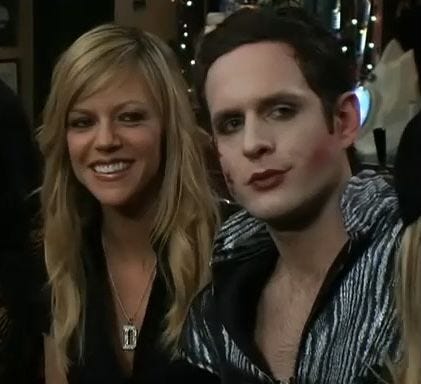
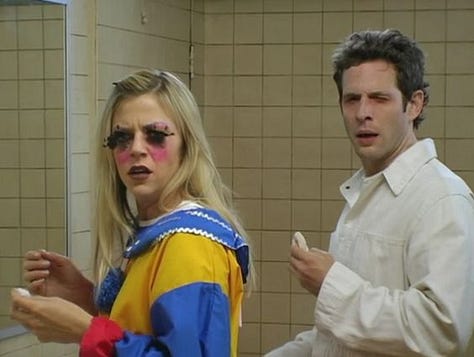

Calvin (cont.): Nobody wants to go to work every day of their lives, but there are certainly plenty of times I look forward to serving a line of people down the block. It’s invigorating. I feel purposeful. So I think if people really can’t stand to bear the weight of their professions and the grind of the 9-5 life, it’s not like that’s the only option. You just have to figure out what is truly important (to you and you alone!) to keep, and what can be lost. Nobody’s life is perfect, and everybody’s warring their desires against their realities.
I do think that more affluent suburban areas put a gross amount of pressure on young people to have one-track lives. If you tell a kid from the time they’re conscious that they have to hit certain benchmarks in their lives, or else they’re totally screwed, you are going to end up with a dispassionate, aimless class of overqualified white-collar workers.
Everyone is entitled to want the job they want, but if you don’t even tell kids that there are other options than a certain approved sect of professions, then they are going to sit at home and make self-pitying posts about applying for 50 things on LinkedIn that they can’t even get interviews for.
Also, I’m no great economic forecaster, but definitely, in my experience, we need more young, smart people in trade work. A lot of the electricians, carpenters, plumbers, or refrigeration specialists are pretty old and not the easiest to deal with. I think it especially falls on parents to let their kids explore different weird paths through life.
I’m very lucky to not only have grown up the way I did but to have been told by our parents that I didn’t have to do the same shit with my life. As long as I was doing it on my own, and I was doing something at least, I’ve felt like my choices have been worth it.
I’ve been awfully complimentary to Calvin throughout this piece which is a new and weird sensation for me. But I guess so is seeing your sibling as the adult they’ve become rather than just the whiny bitch you shoved off the play set onto a concrete patio 23 years ago.6
Knowing my parents would absolutely eat this next question up which would allow me to take back some of the favor and attention after Calvin’s last response, I thoughtfully and generously wanted to ask:
Emily: What have you done professionally that you are most proud of?
Calvin: Obviously it’s cool to be in charge of a restaurant in Manhattan, but I think the thing I am most proud of in my life is my time at the last place I worked at, Italian Kitchen in Connecticut.
First of all, when I first started there, I was so ass that I almost got fired after a few weeks. I think that embarrassment just propelled me forwards in a crazy way, and I ended up learning so much while I was there that still sticks with me. Also, it was a true, family-run small business navigating through one of the toughest times for said type of business.
While it’s nice now to work at a place that has an HR department, doing all the shit I did at Italian Kitchen with a group of seven people prepared me like nothing else could. Shout out Dom.
And finally, I wanted to end by asking:
Emily: What's your favorite sandwich to make?
Calvin: My favorite sandwich to make is anything that makes me have to do a bunch of different things with my arms and hands like a crazy bartender. I love my spot now but I do miss making heroes. There it something so aesthetically pleasing about wrapping up a sandwich in old school deli paper.
Here I was giving him a chance to hawk the sandwich named after him (La Calvino, available at the Sullivan Street All’ Antico shop) but I suppose his response is truly the most fitting end to today’s piece.
Thank you to Calvin for joining me today!!! While it was campy and funny to say we were estranged for a bit, I much prefer having him in my life so we can have conversations like this.
One of the best books I read in 2023, by the way.
Byock explains in the book that midlife crises often come about when an individual who has lived their life staunchly as “their type” hits a point where they realize they either lack passion or stability and intensely crave that missing piece.
I’ve hyperlinked the definition of “reading someone for filth” for my dad as well as any other dads reading this—you’re welcome.
Christopher Nolan Inception-ass layered explanation.
Coffee milk, Nesquick strawberry milk, and plain 2% milk like a fucking sociopath, respectively.
And I’d do it again.



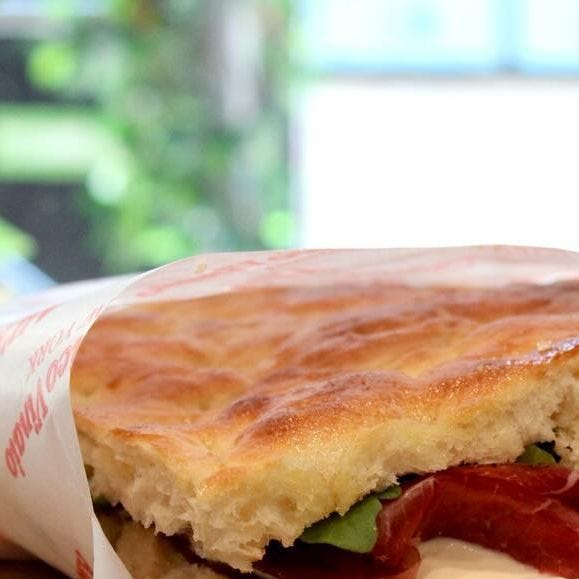
Absolutely loved this piece…as someone who still chooses to work in the service industry instead of corporate, this was so refreshing to see a different perspective that I can relate to!! Incredible writing, incredible story and incredible siblings that I dearly miss!!!